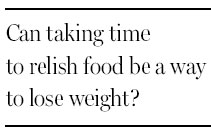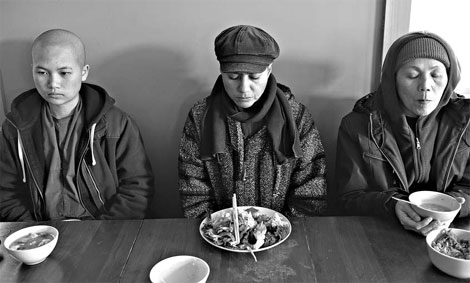Exploring the benefits of reflective eating
Updated: 2012-03-04 07:49
By Jeff Gordinier (The New York Times)
|
||||||||
|
At the Blue Cliff Monastery, Buddhist residents are joined by lay people once a week for a free session of mindful eating. [Jennifer May for The New York Times] |
Could an eating discipline pioneered by Buddhist monks and nuns help teach us how to get healthy, relieve stress and shed many of the neuroses that we've come to associate with food?
It involves becoming aware of that reflexive urge to plow through your meal. Resist it. Leave the fork on the table. Chew slowly. Stop talking. Pay close attention to the sensation and purpose of each morsel of food. Continue this way throughout the course of a meal, and you'll experience the third-eye-opening pleasures and frustrations of a practice known as mindful eating. It's about experiencing food more intensely.
"This is anti-diet," said Dr. Jan Chozen Bays, a pediatrician and meditation teacher in Oregon and the author of "Mindful Eating: A Guide to Rediscovering a Healthy and Joyful Relationship With Food." "The fundamental problem is that we go unconscious when we eat."
A Harvard University nutritionist, Dr. Lilian Cheung, is passionately encouraging corporations and health care providers to try it.
"The rhythm of life is becoming faster and faster, so we really don't have the same awareness and the same ability to check into ourselves," said Dr. Cheung, who, with the Vietnamese Buddhist monk Thich Nhat Hanh, co-wrote "Savor: Mindful Eating, Mindful Life." "That's why mindful eating is becoming more important. We need to be coming back to ourselves and saying: 'Does my body need this? Why am I eating this? Is it just because I'm so sad and stressed out?'"
At the Blue Cliff Monastery, in Pine Bush, New York, about 110 kilometers northwest of Manhattan, lay people can join Buddhist brothers and sisters for a free "day of mindfulness" twice a week. At a gathering in January, visitors watched a videotaped lecture by Thich Nhat Hanh. At lunch, no one spoke. A long buffet table of food offered vegetarian fare prepared by two monks.
It looked peaceful, but inside some of those heads, a struggle was afoot.
"It's much more challenging than we would imagine," said Carolyn Cronin, 64, who regularly attends the mindfulness days. "People are used to eating so fast. This is a practice of stopping, and we don't realize how much we're not stopping."
It's mindful eating's potential as a psychological barrier to overeating that has generated excitement among nutritionists like Dr. Cheung.

"Thich Nhat Hanh often talks about our craving being like a crying baby who is trying to draw our attention," she said. "When the baby cries, the mother cradles the baby to try to calm the baby right away. By acknowledging and embracing our cravings through a few breaths, we can stop our autopilot of reaching out to the pint of ice cream or the bag of chips."
The average person doesn't have the luxury of ruminating on the intense tang of sriracha sauce at a monastery. "Most of us are not going to be Buddhist monks," said Dr. Michael Finkelstein, a holistic physician. "What I've learned is that it has to work at home."
He and others suggest that people should start with a few baby steps. "Don't be too hard on yourself," Dr. Cheung said. "You're not supposed to be able to switch on your mindfulness button and be able to do it 100 percent. It's a practice you keep working toward."
At the Google headquarters in Mountain View, California, hundreds of employees showed up when Thich Nhat Hanh dropped by for a day of mindfulness in September. An hourlong wordless vegan lunch is now a monthly observance on the Google campus.
"Interestingly enough, a lot of the participants are the engineers, which pleases us very much," said Olivia Wu, an executive chef at the company. "Somebody will say, 'I ate so much less.' And someone else will say, 'You know, I never noticed how spicy arugula tastes.'"
And that could be the ingredient that helps mindful eating gain traction in mainstream culture: flavor.
"So many people now have found themselves in an adversarial relationship with food, which is very tragic," Dr. Bays said. "Eating should be a pleasurable activity."
The New York Times

 'Taken 2' grabs movie box office crown
'Taken 2' grabs movie box office crown
 Rihanna's 'Diamonds' tops UK pop chart
Rihanna's 'Diamonds' tops UK pop chart
 Fans get look at vintage Rolling Stones
Fans get look at vintage Rolling Stones
 Celebrities attend Power of Women event
Celebrities attend Power of Women event
 Ang Lee breaks 'every rule' to make unlikely new Life of Pi film
Ang Lee breaks 'every rule' to make unlikely new Life of Pi film
 Rihanna almost thrown out of nightclub
Rihanna almost thrown out of nightclub
 'Dark Knight' wins weekend box office
'Dark Knight' wins weekend box office
 'Total Recall' stars gather in Beverly Hills
'Total Recall' stars gather in Beverly Hills
Most Viewed
Editor's Picks

|

|

|

|

|

|
Today's Top News
Health new priority for quake zone
Xi meets US top military officer
Japan's boats driven out of Diaoyu
China mulls online shopping legislation
Bird flu death toll rises to 22
Putin appoints new ambassador to China
Japanese ships blocked from Diaoyu Islands
Inspired by Guan, more Chinese pick up golf
US Weekly

|

|








